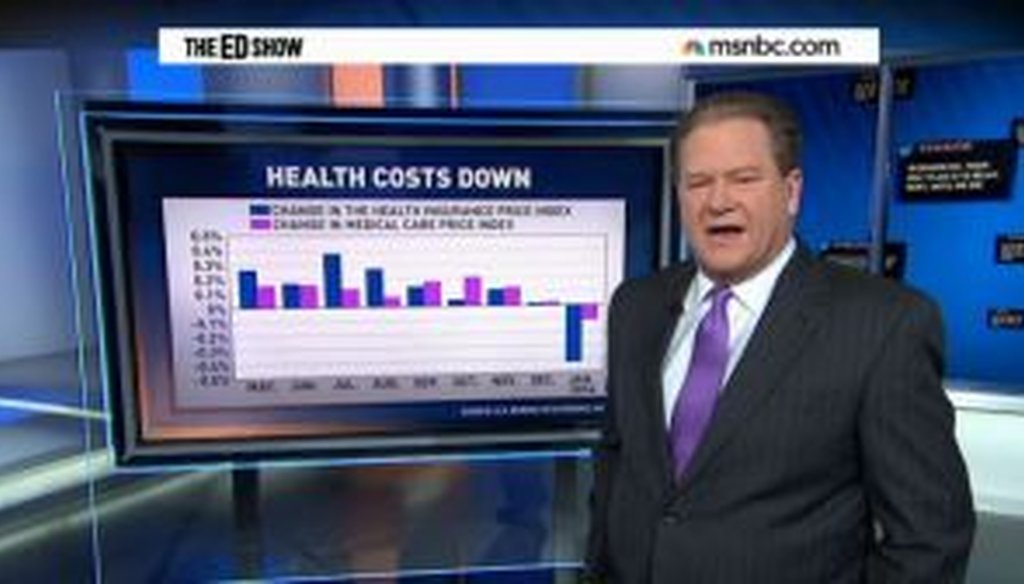Stand up for the facts!
Our only agenda is to publish the truth so you can be an informed participant in democracy.
We need your help.
I would like to contribute

MSNBC host Ed Schultz points to a drop in a couple of health care price indices to show that Obamacare is pushing costs down.
PunditFact covered plenty of ground in the past week, from fact-checking claims about the minimum wage to the NCAA men’s basketball tournament.
Here’s a brief summary of their recent work; links will take you to the complete analysis and source lists. Read more online at PunditFact.com.
The statement: The NCAA will "get billions" from the men’s basketball tournament. "Players get a trophy." -- Houston Texans running back Arian Foster, March 19 in a tweet.
The ruling: The NCAA and its members schools certainly gain a lot more financially from the men’s basketball tournament than the players. But Foster, a star NFL running back, is off on his numbers. According to the Indianapolis Star, the NCAA brought in nearly $770 million in 2013 because of March Madness. That’s about 84 percent of the organization’s total revenues for the year. The largest benefit for student athletes, meanwhile, is athletic scholarship dollars. The NCAA contributed the equivalent of $125 million in athletic scholarships for the 2012-13 season. Foster’s point that the NCAA and colleges get a lot more out of the deal than the players is accurate. His specifics, however, are off. We rate his claim Half True.
The statement: "Two-thirds of the people who receive the minimum wage are female." -- Cokie Roberts, March 31 on NPR.
The ruling: Of the 75.9 million Americans who earn hourly wages (and make up half of the nation’s workforce), 1.5 million earn exactly the federal minimum wage of $7.25 an hour, and 1.8 million earn less than that, according to the federal Bureau of Labor Statistics. Of the 3.3 million people who earn at or below the federal minimum wage, 2.06 million people are women, the Bureau of Labor Statistics says. That translates to 62.4 percent, which is close but a little short of two-thirds. The Bureau of Labor Statistics statistics have one other shortcoming — they don’t account for all people in states where the minimum wage is greater than $7.25 an hour. In Florida, the current minimum wage is $7.93 an hour. We rated Roberts’ claim Mostly True.
The statement: "Less than 1 percent of 1 percent of the American population has given an amount over $200" to a federal political campaign. -- Heather McGhee, April 2 on MSNBC.
The ruling: It’s true that a relative tiny portion of the American population gives over $200 to federal political campaigns. But McGhee is off by at least a factor of 10. The Center for Responsive Politics has tracked federal campaign donations for many years. According to their latest data, 366,000 people have given $200 or more so far in the 2013-14 election cycle. That’s about 10 times more than McGhee suggested.
It’s worse news for McGhee if you look at the 2012 election. That year, over 1.2 million people gave $200 or more to a federal candidate or political committee. As a percentage, that’s 0.4 percent. McGhee was saying .01 percent. We rated her claim Mostly False.
The statement: Health insurance and medical costs "are going down because of Obamacare." -- Ed Schultz, March 24 on MSNBC.
The ruling: Schultz is relying on a January one-month change in a price index that tracks the cost of health care. But the price index Schultz is referencing varies significantly from month to month, and experts say it’s not a true indication of health care costs, especially through the prism of Obamacare. Other measures, meanwhile, say costs have increased slightly or remained relatively stable. The takeaway: There is not enough data to reach a defensible conclusion. We rated Schultz’s claim Mostly False.
Our Sources
See individual fact-checks for complete sources.
































